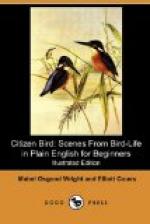“She will come by and by, dear,” said Olive. “You know your father had to go away on business, and you wouldn’t like him to go all alone.”
“Why do people have business?”
“To earn money, to be sure, to buy your pretty frocks and shoes, and give you plenty to eat.”
“But House People are the only ones who must work for what they have—everything else takes what it wants.”
“There is where you are very much mistaken, Miss Dodo. Everything works for its living in some way. Take, for example, the birds that you are going to study. They have to build their own houses, and feed their children, and travel about every year on their own particular business.”
“Travel—do birds travel?” cried both children in the same breath. “Oh, where do they go, and what for?”
“Father will tell you about that. Now you must do what he said—each find a bird, and see if you can describe it. Suppose we sit on this great root. It belongs to the oldest tree in the orchard, and Grandmother Hunter used to play house up in the top of it when she was a little girl. Father told me he had a perch up there when he was a boy, so that he could watch the birds. Perhaps, if you are careful and really want to keep quiet and see the birds, he will have one fixed for you.”
“How jolly!” said Nat. “Sh-h! I see a bird now—such a queer little thing—it’s running round like a mouse. Oh! oh! it goes just as well upside down as any other way.” And Nat pulled out his pencil and book and waited for the bird to come in sight again, which it was kind enough to do very soon.
“Size”—wrote Nat, struggling with his pencil, which would squeak, because he had foolishly put it in his mouth. “How big would you call it?”
“Little,” said Dodo promptly.
“Kind of little, but not so very. I’ve seen smaller in the Museum,” said Nat. “What would you call it, Olive?”
“I should call it rather a small bird, if I were not speaking exactly. But if you wish to be more particular you must try to guess its length in inches. When I was about your age father measured my right-hand middle finger and told me it was three inches long. Then he made two marks across it with violet ink, which takes a long time to wash off, so that my finger made a three-inch measure. I soon grew accustomed to look at a bird and then at my finger, from nail to knuckle, and then try to tell how many times longer the bird was from the point of his beak down over his back to the tip of his tail. Of course I made a great many mistakes and could seldom tell exactly, but it was a great help.”
“How long is my finger?” asked Nat eagerly, spreading out a rather large hand for a boy of ten.
“About four inches.”
“Then that bird is quite a little longer than that—five or six inches anyway.” And he wrote, “Length, five or six inches.”
“Ah, he has gone,” wailed Dodo. “Oh, no, he hasn’t. He has come round the tree again—he says squank, squank, squank, as if his voice was rusty. Is that his song, Cousin Olive?”




